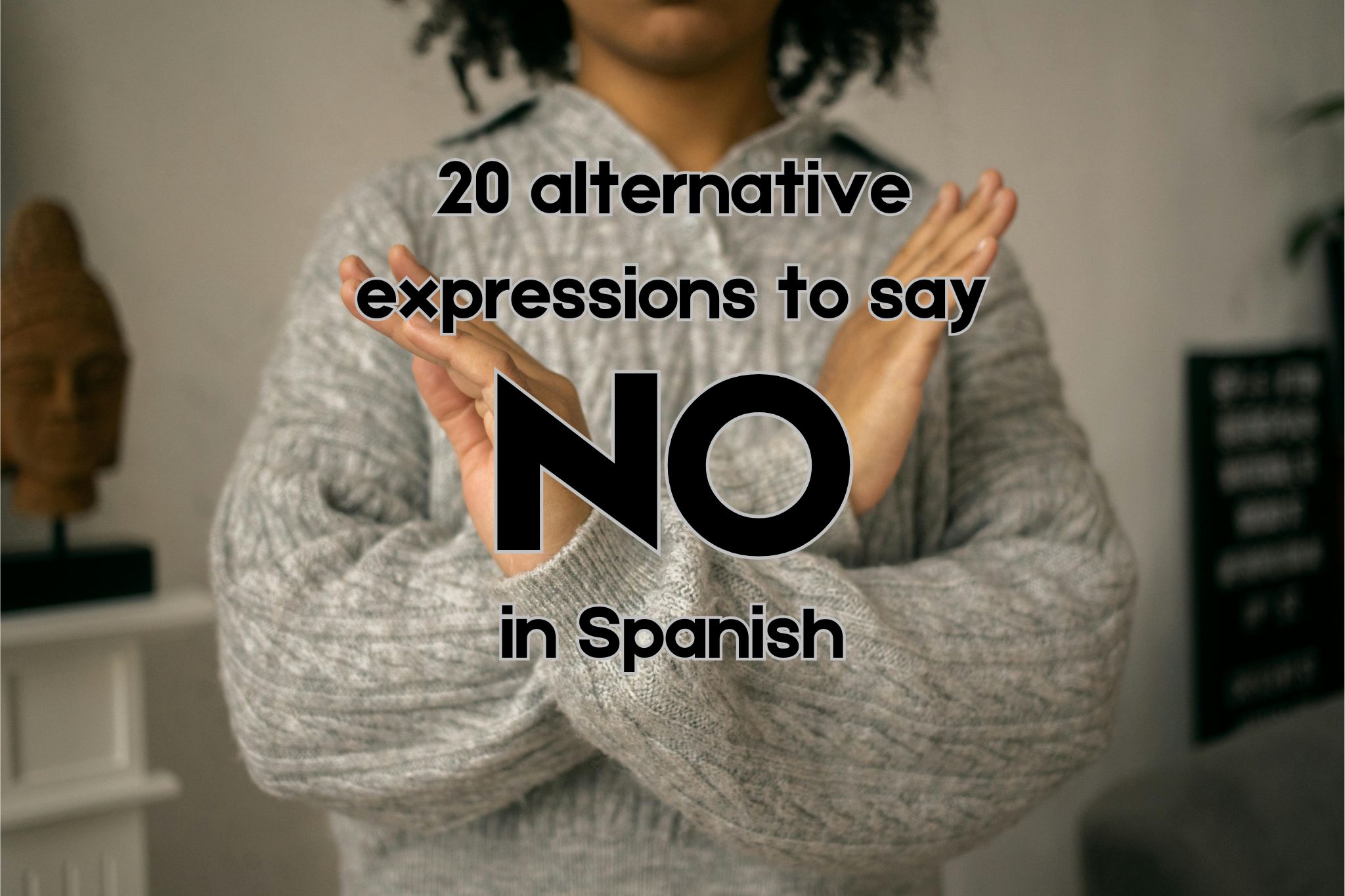How to say No in Spanish: Beyond the basics

Get our free email course, Shortcut to Conversational.
Have conversations faster, understand people when they speak fast, and other tested tips to learn faster.
More infoWhen learning a new language, one of the first words people often learn is no. It’s a simple, universally recognized word. However, in Spanish, just like in English, there are various ways to express refusal, denial, or negation. So, today we will explore the different ways to say No in Spanish, focusing on common refusal phrases, and contexts where they’re used.
Let’s get started!
The Basics: No
The most straightforward translation of no in Spanish is simply no. It’s used in the same way as in English, and it’s universally understood by Spanish speakers. The English particle not is also translated as no in Spanish
- ¿Quieres ir a la playa? / No, tengo ganas de quedarme en casa. – Do you want to go to beach? / No, I feel like staying home.
- ¿Has visto mi billetera? / No, ¿seguro que la trajiste? – Have you seen my wallet? / No, are you sure you brought it?
- No quiero ir. – I do not want to go.
- No me gusta. – I do not like it.
Other Ways to Say No in Spanish
Just like in English, there’s more to denying or refusing than just the word no in Spanish. Let’s see a range of other words and expressions that we can use as alternatives to our simple Spanish no.
Nop – Nope
Nop is a casual and very informal way to say no in Spanish. It’s similar to how you use nope in English, in that it’s commonly used in conversations among friends or in informal settings.
- Dani, ¿viste la película que te recomendé el fin de semana? / Nop, pero te prometo que hoy la veo. – Dani, did you see the movie I recommended to you over the weekend? / Nope, but I promise I’ll watch it today.
- ¿Vienes a la fiesta de Andreina? / Nop, estaré ocupada estudiando. – Are you coming to Andreina’s party? / Nope, I’ll be busy studying.
Nel – Nah
Nel is another informal and colloquial way to say no, commonly used in Mexico. It’s often used among friends or in very casual contexts, similarly to how you use nah in English.
- ¿Quieres probar esto? / Nel, tiene demasiado picante. – Do you want to try this? / Nah, it’s too spicy.
- ¿Vas a salir esta noche? / Nel, hoy es el cumpleaños de mi papá. – Are you going out tonight? / Nah, it’s my dad’s birthday today.
Negativo – Negative
Negativo is a more formal or emphatic way to say no. Like the English equivalent negative, it’s often used in professional or military contexts. It’s also sometimes used as slang in informal contexts.
- ¿Es viable este plan? / Negativo, capitán. – Is this plan feasible? / Negative, Captain.
- ¿Están listos para la misión? / Negativo. – Are you ready for the mission? / Negative.
Jamás, Nunca – Never
Both of these words translate as never, and are used to reject something emphatically. We use jamás or nunca to indicate that something has never happened or will never happen.
- Yo jamás te he ocultado cosas. – I have never kept things from you.
- Nunca he tenido una consola de videojuegos. – I’ve never owned a video game console.
- Jamás nos veremos de nuevo. Adiós. – We’ll never meet again. Goodbye.
- ¿Aceptarás la invitación de Javier? / ¡Nunca! Él es demasiado odioso. – Will you accept Javier’s invitation? / Never! He’s too obnoxious.
Para nada – Not at all
Para nada translates to not at all. It’s often used to emphasize a negative response. It is suitable in both formal and informal situations, and is used to completely dismiss or refute a statement.
- ¿Te molestó lo que dije? / Para nada, no te preocupes. – Were you upset by what I said? / Not at all, don’t worry.
- ¿Estás cansado? / Para nada, nunca estuve más despierto. – Are you tired? / Not at all, I’ve never been more awake.
En lo absoluto – Not at all
Similar to para nada, this expression can also be translated as not at all. En lo absoluto, however, is slightly more formal.
- ¿Estás preocupado por el proyecto? / En lo absoluto, creo que hicimos un gran trabajo. – Are you worried about the project? / Not at all, I think we did a great job.
- ¿Te resulta difícil estudiar por las noches? / En lo absoluto, por las noches estoy más despierto. – Do you find it difficult to study at night? / Not at all, I am more awake at night.
De ninguna manera – No way
This phrase can be interpreted as an equivalent to the English expression no way. It’s used to express strong refusal or disagreement.
- Papá, ¿me dejarías ir a la fiesta? / De ninguna manera, mañana tienes examen y debes estudiar. – Dad, will you let me go to the party? / No way, you have an exam tomorrow and you have to study.
- Esto es lo mejor que podemos ofrecerte por el momento, ¿aceptarías la propuesta? / De ninguna manera, es muy poco para tanto trabajo. – This is the best we can offer you for the moment, would you accept the proposal? / No way, it’s too little for so much work.
No me da la gana – I don’t feel like it
No me da la gana is a strong and somewhat rude way to say I don’t feel like it. It’s used to express a strong personal refusal or unwillingness, and is commonly associated with bratty teenagers.
- ¿Por qué no has lavado los platos? / Porque no me da la gana. – Why haven’t you washed the dishes? / Because I don’t feel like it.
- Limpia tu habitación ahora. / No me da la gana, lo haré mañana. – Clean your room now. / I don’t feel like it, I’ll do it tomorrow.
Nada de eso – No way, None of that
This phrase literally means none of that, implying that what is proposed or suggested isn’t true or is highly unwanted. It can also be interpreted as an equivalent of no way in Spanish.
- Mamá, hoy me voy a quedar en casa de Alejandra. / Nada de eso, señorita. Ya te quedaste en su casa anoche. – Mom, today I’m going to stay at Alejandra’s house. / No way, Miss. You already stayed at her house last night.
- Me dijeron que te gusta Luis. / ¡Nada de eso! ¿Quién te lo dijo? – I heard you like Luis. / No way! Who told you that?
- Faltemos mañana a clases, ¿qué dices? / Nada de eso, no voy a perder mi récord de asistencia. – Let’s skip school tomorrow, what do you say? / No way, I’m not going to lose my attendance record.
Ni hablar – Not a chance
Ni hablar is another way to express no way or not a chance in Spanish. It is used to express outright rejection or refusal of something that’s been proposed.
- ¿Te mudarías de Buenos Aires? / Ni hablar, a mí me encanta esta ciudad. – Would you ever move out of Buenos Aires? / No way, I love this city.
- Vamos a tomarnos unas cervezas. / ¿Un lunes? Ni hablar, tengo mucho por hacer. – Let’s have a few beers. / On a Monday? No way, I have a lot to do.
Ni en tus sueños – In your dreams, Not even in your dreams
This phrase translates literally as not even in your dreams, and is used to convey strong disbelief with a sarcastic tone. Ni en tus sueños is a strong way to say no in Spanish, indicating that something is completely out of the question.
- Sara, ¿irías conmigo al baile de graduación? / ¡Ni en tus sueños! – Sara, will you go with me to prom? / In your dreams!
- ¿Me prestarías tu auto hoy? / Ni en tus sueños, todavía no está asegurado. – Would you lend me your car today? / In your dreams, it’s not insured yet.
Ni en broma – Not even as a joke, No way
Just like the previous phrase, ni en broma is used to emphasize that something is totally out of the question. It literally means not even as a joke, and is used to reject ideas that are considered absurd or unreasonable.
- ¿Volverías con tu ex novio? / ¡Ni en broma, amiga! – Would you get back together with your ex-boyfriend? / No way, girlfriend!
- Faltemos a clase hoy. / ¿Qué? Ni en broma, hoy van a explicar un tema nuevo. – Let’s skip class today. / What? No way, they’re going to explain a new subject today.
Ni lo pienses – Don’t even think about it
No lo pienses translates to don’t even think about it. It’s used to firmly say no in Spanish.
- ¿Me prestas tu tarjeta de crédito? / Ni lo pienses, no sucederá. – Can I borrow your credit card? / Don’t even think about it, it won’t happen.
- Creo que me haré un tatuaje nuevo este verano. / Ni lo pienses, ya tienes demasiados. – I think I’ll get a new tattoo this summer. / Don’t even think about it, you already have too many.
Ni se te ocurra – Don’t even think about it
This expression is very similar to the previous one, albeit a bit more informal. It also translates to don’t even think about it.
- Le diré a Luisa que me acompañe a la tienda. / Ni se te ocurra, está de muy mal humor. – I’ll tell Luisa to accompany me to the store. / Don’t even think about it, she’s in a very bad mood.
- Voy a faltar a la reunión de hoy, estoy muy cansado. / Ni se te ocurra, tienes que estar ahí. – I’m going to miss today’s meeting, I’m very tired. / Don’t even think about it, you have to be there.
Claro que no – Of course not
Meaning of course not, claro que no is used to deny something strongly but politely.
- ¿Vas a aceptar ese trabajo tan mal pagado? / Claro que no. Además, ya recibí otra oferta. – Are you going to take that low-paying job? / Of course not. Besides, I already got another offer.
- ¿De verdad no le contaste el secreto a nadie? / ¡Claro que no! Jamás haría algo así. – You really didn’t tell anyone the secret? / Of course not! I’d never do anything like that.
Por supuesto que no – Of course not
Similar to the previous expression, por supuesto que no also translates to of course not, but with a bit more emphasis.
- ¿Crees que él tiene razón? / Por supuesto que no, pero no tengo ganas de discutir. – Do you think he’s right? / Of course not, but I don’t feel like talking about it.
- ¿Permitirías que tus hijos salieran sin permiso? / Por supuesto que no, aún son muy pequeños. – Would you allow your children to go out without permission? / Of course not, they are still too young.
¡Qué va! – No way!
Equivalent to no way! or yeah, right!, ¡qué va! is a colloquial expression used to dismiss something outright.
- ¿Es verdad que puedes hablar diez idiomas? / ¡Qué va! Solo hablo inglés y un poco de español. – Is it true that you can speak ten languages? / No way! I only speak English and a little Spanish.
- ¿Alguna vez has ido a una discoteca? / ¡Qué va! A mí no me gustan esos sitios. – Have you ever been to a discotheque? / No way! I don’t like those places.
Bajo ningún concepto – Under no circumstances, By no means
Bajo ningún concepto is used for strong, formal refusals. It’s commonly used as a way to say no in Spanish in formal contexts.
- ¿Aceptarías esa propuesta ilegal? / No la aceptaría bajo ningún concepto. – Would you accept this illegal proposal? / I would not accept it under any circumstances.
- Director, ¿le parece bien que los alumnos salgan a la calle en horario escolar? / ¡Bajo ningún concepto! Nuestra prioridad es la seguridad de los alumnos. – Principal, is it okay for students to go out on the street during school hours? / Under no circumstances! Our priority is the safety of the students.
¿Estás loco/a? – Are you crazy?
This phrase is used as a rhetorical question that emphasizes the speaker’s incredulity and rejection of the proposed idea. Note that depending on the gender of the person being addressed, the expression can either be masculine or feminine.
- Vayamos a acampar a la montaña hoy. / ¿Estás loco? Mañana es miércoles. – Let’s go camping in the mountains today. / Are you crazy? Tomorrow is Wednesday.
- Voy a comprar ese sofá. / ¿Estás loca? Es demasiado caro. – I’m going to buy that couch. / Are you crazy? It’s too expensive.
El horno no está para bollos – It’s not a good moment
El horno no está para bollos is a Spanish idiom that translates literally as the oven is not ready for buns. However, its figurative meaning is that it’s not a good time for something, often because the situation is already tense, complicated, or unfavorable.
- ¿Puedo pedirte un gran favor grande? / Lo siento mucho, el horno no está para bollos. Ahora no tengo tiempo. – Can I ask you a big favor? / I’m very sorry, it’s not a good moment. I don’t have time right now.
- Invitaré a salir a Victoria esta noche. / Amigo, el horno no está para bollos. Acaba de pelear con su mejor amiga. – I’ll ask Victoria out tonight. / Dude, it’s not a good moment. She just had a fight with her best friend.
Conclusion: No in Spanish
So after reading through all of these options, how do you say no in Spanish? Today we went way beyond the simple Spanish word for no, introducing a broad spectrum of phrases for expressing denial or refusal. From straightforward to emphatic, and informal to formal, we’ve just seen expressions convey such sentiments as no way!, not a chance!, and in your dreams!
By learning a handful of these expressions, you can effectively communicate refusal, denial, or negation in different contexts and nuances. Whether you’re turning down an offer, rejecting an idea, or simply expressing that something is not possible, these phrases will help you convey your message clearly and appropriately.
So have you had enough learning for today? ¡Por supuesto que no! – Of course not! To keep going, why not check out our related vocab posts on how to say Stop and Shut up! in Spanish, our comparison posts on ningún vs ninguno and también vs tampoco, and our grammar post on double negatives in Spanish.



